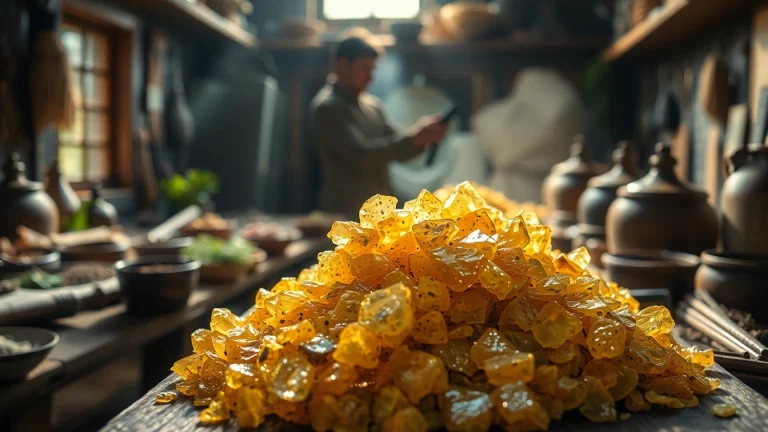
Understanding Benjoin: Benefits, Uses, and Traditional Wisdom
What is Benjoin? Exploring Its Origins and Characteristics
Benjoin, a fragrant resin derived from the bark of trees belonging to the Styrax genus, has a rich history steeped in both cultural significance and botanical intrigue. Renowned for its sweet, balsamic aroma, this resin is not only a favored ingredient in perfumery but also plays a vital role in traditional herbal medicine. Understanding the origins and characteristics of benjoin is crucial for appreciating its many applications and benefits.
Historical Significance of Benjoin in Herbal Medicine
Historically, benjoin has been utilized across various cultures for its therapeutic properties. It is thought to have been first recorded in ancient texts around the 10th century, where it was employed in traditional Chinese medicine for its positive effects on respiratory health. Various civilizations, including those of the Middle East and Europe, have valued benjoin for its ability to enhance spiritual practices and promote healing.
In ancient Egypt, benjoin was commonly used in incense during spiritual ceremonies. This practice significantly influenced its associations with purification and healing. Furthermore, medieval practitioners in Europe acknowledged benjoin as a valuable ingredient in remedies aimed at alleviating respiratory ailments such as coughs and bronchitis.
Chemical Composition and Properties of Benjoin
The chemical composition of benjoin is diverse, containing several bioactive compounds that contribute to its therapeutic effects. The main constituents include benzoin acid, benzoic acid, and a variety of volatile oils that provide its characteristic scent. These compounds exhibit antimicrobial and anti-inflammatory properties, contributing to benjoin’s efficacy in treating various ailments.
Additionally, the presence of catechins and flavonoids in benjoin enhances its antioxidant capability, making it a valuable substance not only in the realm of herbal medicine but also in modern health applications.
Common Forms and Sources of Benjoin
Benjoin is typically available in several forms, including resin, essential oil, and tincture, each catering to different applications. The most common source of benjoin is the Styrax benzoin tree, primarily found in Southeast Asia, particularly Indonesia and Sumatra. The resin is harvested by making incisions in the tree’s bark, allowing the sap to ooze out and harden into ‘tears’ of resin.
As an essential oil, benjoin can be extracted through steam distillation, resulting in a concentrated form that captures its aromatic and therapeutic properties. The tincture form, made by soaking benjoin in alcohol, retains the resin’s beneficial compounds and is often used in herbal formulations.
The Benefits of Benjoin: Health and Wellness Insights
Benjoin offers a wealth of health benefits, from physical health promotion to emotional well-being. These benefits, backed by historical usage and contemporary studies, make benjoin a valuable addition to any health regimen.
Therapeutic Uses of Benjoin in Modern Herbalism
In modern herbalism, benjoin is celebrated for its anti-inflammatory, expectorant, and antiseptic properties. It is commonly used to soothe respiratory conditions, such as bronchitis and common colds, by facilitating the elimination of phlegm and reducing cough severity. Additionally, benjoin has gained recognition for its ability to improve skin health, where it is applied topically to treat wounds and skin irritations.
Moreover, in aromatherapy, benjoin is employed for its calming effects. When diffused or inhaled, it can help reduce anxiety and foster a sense of tranquility.
Antioxidant and Anti-Inflammatory Properties
Research has shown that benjoin exhibits significant antioxidant and anti-inflammatory effects, which can be beneficial for overall health. The antioxidants present in benjoin may help combat oxidative stress, reduce the risk of chronic diseases, and promote healthy aging. For individuals dealing with inflammatory conditions, incorporating benjoin into their wellness routines may provide relief and support recovery.
A study published in a peer-reviewed journal found that benjoin demonstrated potent anti-inflammatory activity, suggesting its potential applications in treating inflammatory disorders.
Emotional and Spiritual Benefits of Benjoin
The emotional and spiritual benefits of benjoin are equally noteworthy. Traditionally, it has been used in meditation practices to promote mindfulness and inner peace. Its soothing aroma is believed to enhance mental clarity and support emotional healing, making it an ideal choice for individuals seeking to balance their emotional health.
Furthermore, the rituals surrounding benjoin have transcended cultural boundaries, linking it to spiritual purification and protection. Many people incorporate benjoin resin into their spiritual practices, using it in incense to cleanse spaces and elevate the atmosphere during rituals.
How to Use Benjoin: Practical Applications
For individuals interested in integrating benjoin into their health and wellness routines, there are numerous practical applications to consider. From aromatherapy to DIY formulations, benjoin offers versatility that caters to various needs.
Incorporating Benjoin in Aromatherapy and Meditation
Aromatherapy is one of the most popular methods for utilizing benjoin. Whether through a diffuser or by adding a few drops to a warm bath, the aromatic qualities of benjoin can transform the atmosphere, promoting relaxation and reducing stress. During meditation, diffusing benjoin can enhance focus and peacefulness, making it an excellent companion for mindfulness practices.
Individuals can also create essential oil blends by combining benjoin with other calming oils such as lavender or frankincense for enhanced effects.
Recipes and Formulations Featuring Benjoin
In addition to aromatherapy, benjoin can be incorporated into various recipes and formulations. One popular way to use benjoin resin is by creating a soothing balm. This can be made by melting a carrier oil, such as coconut or olive oil, and adding crushed benjoin resin. Once cooled, this balm can be applied topically to soothe minor skin irritations and promote healing.
Below is a simple recipe for a benjoin-infused salve:
- Ingredients:
- 1 cup carrier oil (such as olive oil)
- 1 tablespoon crushed benjoin resin
- 1 tablespoon beeswax (optional, for thickness)
- Instructions:
- Heat the carrier oil in a double boiler.
- Add the crushed benjoin resin, stirring until dissolved.
- If using, add beeswax and stir until melted.
- Pour the mixture into a glass jar and allow it to cool before sealing.
Dosage Recommendations and Safety Considerations
When using benjoin, whether in resin, oil, or tincture form, it is essential to adhere to recommended dosages to ensure safety and effectiveness. For topical use, a patch test is advisable to check for skin sensitivity. In general, benjoin essential oil can be blended with a carrier oil and applied to the skin, while the resin can be steeped for teas or tinctures.
As for dosage, starting with a small amount and gradually increasing it is wise. It is crucial to consult with a healthcare professional, especially for individuals who are pregnant, nursing, or have underlying health conditions, before incorporating benjoin into their routine.
Competitors and Market Trends in Benjoin Products
The growing interest in herbal remedies has led to a surge in benjoin products available in the market. Understanding the competitive landscape and consumer preferences can help businesses tailor their offerings effectively.
An Overview of Current Market Players
Numerous companies have begun to manufacture and sell benjoin products, ranging from essential oils to skincare formulations. Major players in the market include established wellness brands that specialize in aromatherapy and organic herbal products. Consequently, the diversification of product offerings allows consumers to choose products that best fit their personal wellness goals and ideals.
Consumer Preferences and Buying Habits
Recent market analyses indicate that consumers prefer natural, ethically sourced products. The demand for organic and sustainably harvested benjoin is rising, as more people prioritize environmental impact in their purchasing decisions. Additionally, buyers increasingly seek transparency regarding ingredient sourcing and product formulations, which influences their purchasing behavior.
Emerging Trends in Benjoin Usage
As awareness of the benefits of benjoin continues to grow, new trends are emerging in its usage. From skincare formulations to stress-relief products, benjoin is increasingly recognized as a multi-functional ingredient. The incorporation of benjoin in beauty products, such as moisturizers and serums, highlights its versatility, while its presence in wellness products showcases a broader acceptance of herbal remedies in everyday health regimens.
Measuring the Impact of Benjoin: Performance and Feedback
The effectiveness of benjoin products can be gauged through customer feedback and scientific research. Understanding consumer experiences and available studies is essential for validating benjoin’s place in health and wellness.
Customer Reviews and Testimonials on Benjoin Products
Reviews and testimonials from consumers provide valuable insight into the performance of benjoin products. Satisfied users often highlight benefits such as improved skin health, relaxation, and respiratory relief. However, individual experiences vary, emphasizing the importance of proper dosage and application methods.
By gathering this feedback, businesses can better understand user preferences and work towards improving their products and services.
Scientific Studies and Research on Benjoin Effectiveness
Numerous studies have been conducted to validate the health benefits attributed to benjoin. Research focusing on its anti-inflammatory and antimicrobial properties demonstrates that benjoin can contribute to overall well-being and may play a role in disease prevention. For example, studies suggest that benjoin extracts possess significant inhibitory effects on inflammation, potentially impacting conditions such as arthritis and other inflammatory diseases.
Challenges and Future Directions for Benjoin in the Market
Despite its many benefits, the market for benjoin faces challenges such as standardization of products and potential adulteration. To ensure consumer safety and product efficacy, standardizing quality across various brands is essential. Future directions may include increased collaboration between researchers and manufacturers to develop enhanced formulations and conduct more rigorous studies on benjoin’s efficacy and safety.
Furthermore, as the trend towards natural remedies continues, there lies an opportunity for benjoin to establish itself as a staple in holistic health approaches, benefiting both consumers and businesses in the long run.


